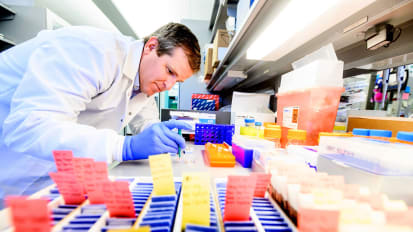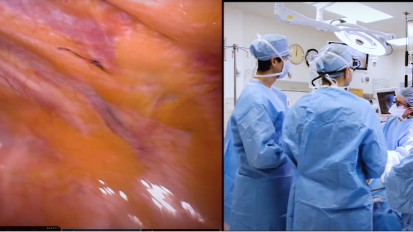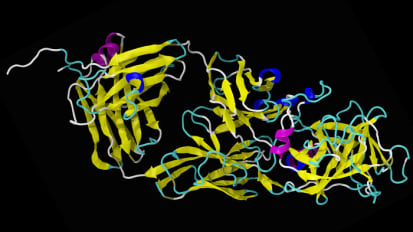Search
 News
News
Genomic Sequencing Is Changing Diagnosis, Treatment for Patients with Brain Cancer
Patients diagnosed with a type of brain tumor survived for longer when they were treated aggressively with surgery, radiation and chemotherapy. News
News
Can Lymph Nodes Boost the Success of Cancer Immunotherapy?
New data from a clinical trial show therapies may activate lymph nodes to produce tumor-tackling T cells. News
News
UCSF Cancer Researcher Thomas Martin Receives $4.6 million CIRM Grant
UC San Francisco’s Thomas G. Martin, MD, a leading expert in blood cancers, has received a grant of nearly $4.6 million from the California Institute of Regenerative Medicine (CIRM) to produce a CAR T cell therapy for multiple myeloma, the second most common malignancy among blood cancers. News
News
Study Finds Significant Chemical Exposures in Women With Cancer
In a sign that exposure to certain endocrine-disrupting chemicals may be playing a role in cancers of the breast, ovary, skin and uterus, researchers have found that people who developed those cancers have significantly higher levels of these chemicals in their bodies. News
News
UCSF Urology Experts Highlight Leadership in Innovative Research and Treatment at National Urology Conference
Using artificial intelligence (AI) to improve prediction of prostate cancer treatment response and biomarkers to enhance prostate cancer diagnosis were among the topics discussed by UCSF clinicians at the American Urological Association’s 2025 annual meeting. News
News
UCSF Health Reaches 15,000 Robotic Surgeries
UCSF Health has the busiest robotic surgery program in the UC health system and is the leading academic medical institution for robotic surgeries in the western U.S. News
News
Improving Prediction of Advanced Breast Cancer Among Women of Different Races and Ethnicities
While regular screenings may decrease the chance of diagnosis of advanced breast cancer in some women and lead to a 20% reduction in breast cancer mortality, other women will be diagnosed with advanced breast cancer despite screening at regular intervals. Document
Document
UCSF Ranked #10 for Cancer Care | Clinical Trials Update
We are pleased to announce that UCSF Medical Center has been recognized as the best hospital in Northern California for cancer care — and among the top 10 cancer programs nationally — by U.S. News & World Report’s 2020-21 survey of Best Hospitals. News
News
Enhancing Care for Thoracic Oncology Surgery Patients
Building on a decades-long reputation for innovation in thoracic surgery, UC San Francisco’s Thoracic Surgery and Oncology Clinic has improved the overall experience for patients undergoing lung and esophageal cancer treatment while continuing to maintain strong outcomes. News
News
Patients With Detectable PSA After Radical Prostatectomy Have Good Long-Term Outcomes, UCSF Researchers Find
Patients with a detectable prostate-specific antigen (PSA) after radical prostatectomy (RP) may have excellent long-term outcomes, according to two retrospective studies conducted by UCSF researchers. News
News
Renowned Expert to Lead UCSF’s Hematology and Oncology Division
Krishna Komanduri, MD, an international leader in hematology-oncology, transplantation and cellular immunotherapy, is the new chief of UCSF’s Division of Hematology and Oncology. Video
Video
Get Current on COVID: The Evidence on Vaccine Efficacy and Strategies for Immunocompromised Patients
A panel of experts answers all the current questions on breakthrough infections, who needs boosters, whether to keep recommending masks, and the future of variants, with a spotlight on meeting the needs of the immunocompromised, such as organ transplant recipients and cancer patients. Bonus: what to know about molnupiravir to treat COVID-19. Video
Video
Adrenal Tumors and Posterior Retroperitoneoscopic Adrenalectomy (PRA): A Case Study
Sanziana Roman, MD, an endocrine surgeon, discusses a patient’s treatment for a tumor in the retroperitoneum, near the adrenal gland. News
News
New Study Looks at Why Cancer Treatments Cause Heart Damage
Teams from UC San Francisco and Stanford University will study why certain cancer treatments cause cardiotoxicities for some patients but not for others. News
News
Felix Feng, Giant in the Field of Prostate Cancer, Dies at 48
“Felix Feng was an exceptional scientist – a once-in-a-generation scientist – and his staggering intellect and scientific insights led to his remarkable scientific accomplishments," News
News
A Novel Approach Towards a Vaccine for Relapsing Acute Myeloid Leukemia: Q&A with Dr. Karin Gaensler
There is a major clinical unmet need for effective and safe therapies to increase progression-free and overall survival in older individuals with leukemia whose prognosis is grim. News
News
Engineered Receptors Help the Immune System Home in on Cancer
Most cancer treatments – from chemotherapies to engineered immune cells – have a host of side effects, in large part because they affect healthy cells in the body at the same time as targeting tumor cells Video
Video
Breast Changes: Managing Lumps, Pain, Discharge and Other Common Concerns
Breast anatomy is complex, and everything from aging to implants can make exams tricky. Breast surgeon Shoko Emily Abe, MD, FACS, offers help with working up common issues that are often benign yet may require treatment or follow-up. News
News
Brachytherapy Improves Outcomes for Cervical Cancer Patients
Patients with locally advanced cervical cancer who receive chemoradiation therapy and brachytherapy and complete treatment within eight weeks have a superior overall survival rate compared to those who don’t receive this treatment, according to a UCSF study. News
News
First-line Pembrolizumab Plus Chemotherapy May Benefit Patients with Advanced Biliary Tract Cancers
The addition of pembrolizumab (Keytruda) to gemcitabine and cisplatin improved overall survival in patients with untreated metastatic or unresectable biliary tract cancer, according to results from the phase III KEYNOTE-966 clinical trial. News
News
Response to Cancer Immunotherapy May Be Affected by Genes We Carry from Birth
A new study finds that inherited genetic variation plays a role in who is likely to benefit from checkpoint inhibitors, which release the immune system’s brakes so it can attack cancer. News
News
Prostate Cancer Study: More Health Benefits from Plant-Based Diet
Men with prostate cancer could significantly reduce the chances of the disease worsening by eating more fruits, vegetables, nuts and olive oil, according to new research by UC San Francisco. Document
Document
Cancer Services Referral Directory
One of the primary objectives at the UCSF Helen Diller Family Comprehensive Cancer Center is to be a partner in care, supporting patients’ treatments and providing physicians with efficient access to our services. Video
Video
Personalized Therapy for Early-Stage Lung Cancer at UCSF
Follow the journey of a UCSF patient with early-stage, high-risk lung cancer, from history to treatment and prognosis, including how surgeons chose to do a robotic assisted VATS lobectomy and an analysis of how well chemo is likely to work for her.

